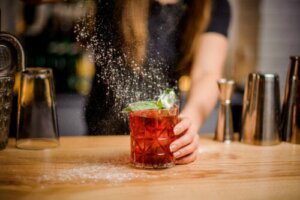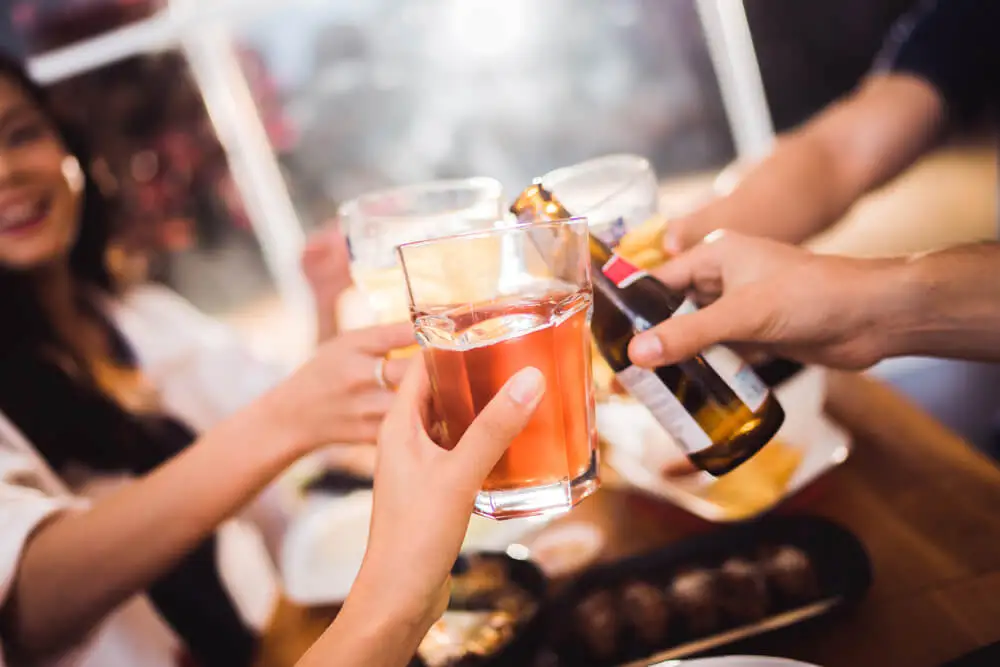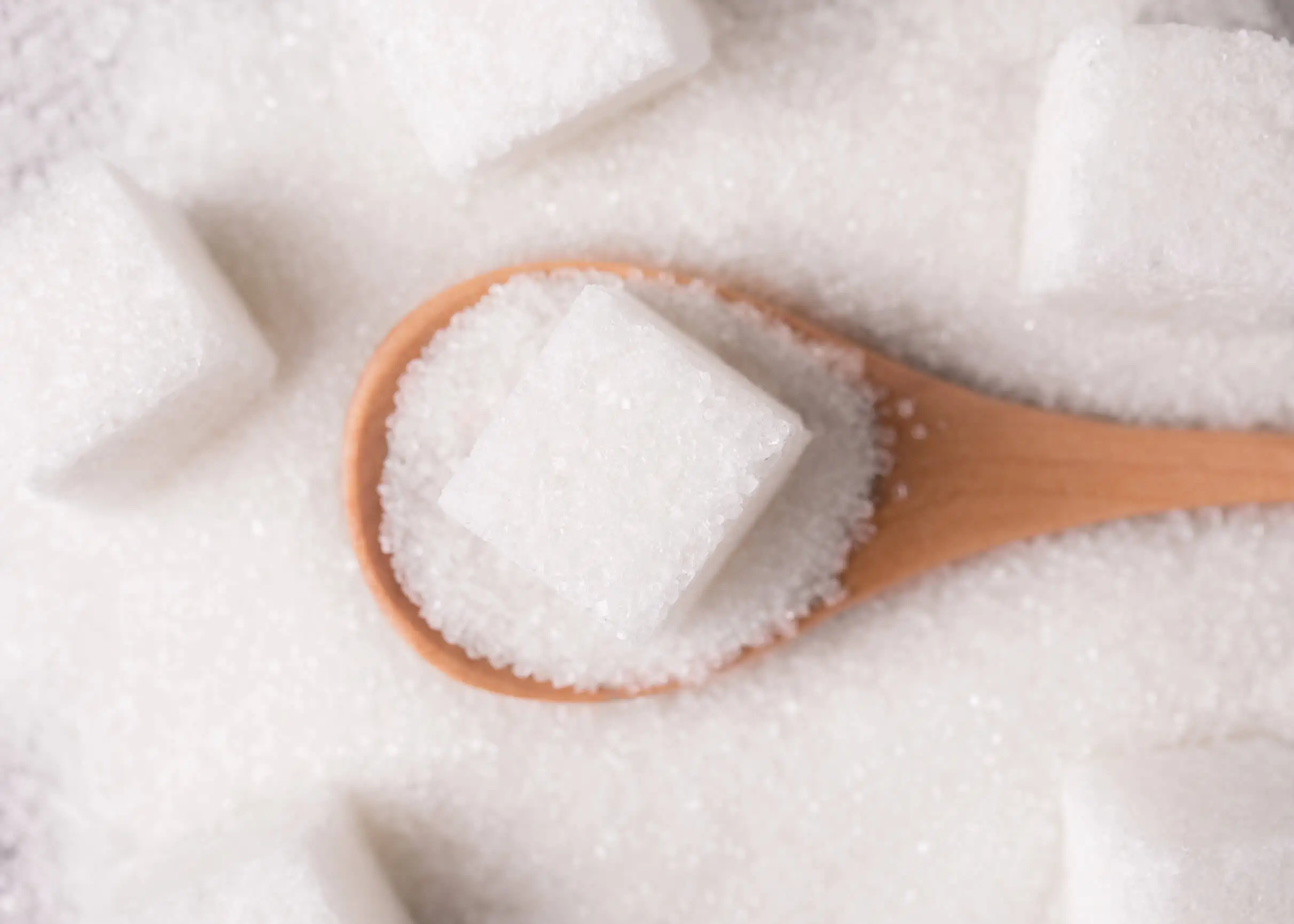Does Mixing Alcohol and Sugar Cause a Hangover? This is what Science Says


Reviewed and approved by the doctor Leonardo Biolatto
The mixture of alcohol and sugar can be harmful in the short, medium, and long term, becoming a double problem. But does this combination cause more hangovers? What’s the truth here?
We can start off by saying that, despite the fact that excessive sugar consumption has a similar effect to that of a hangover, this isn’t exactly what causes the symptoms we experience after drinking. Let’s take a detailed look.
Why do we suffer from hangovers?
Have you ever wondered why you feel the discomfort of the so-called “hangover” the day after you’ve had a few drinks? The reason is that alcohol dehydrates you, depleting the levels of vitamins and minerals, and generating other by-products that have a harmful effect.
We can point out that, when alcohol is ingested, it blocks the production of the antidiuretic hormone (ADH) in the hypothalamus. The kidney then begins to eliminate more water.
It is therefore not uncommon to experience symptoms of dehydration:
- Dizziness
- Extreme thirst
- Drowsiness
- Headaches
- Weakness and fatigue
- Altered heart rhythm
In addition, alcoholic beverages can also affect the digestive system. Thus, pancreatic secretions and intestinal activity are increased and the stomach mucosa is damaged, making it more susceptible to the effects of hydrochloric acid.
According to research on the subject, other hangover symptoms are due to a state of hypoglycemia. Excessive consumption of liquor lowers blood glucose levels, even depleting the reserves in the liver.
As if that weren’t enough, alcohol decreases the production of neurotransmitters (serotonin and prostaglandins). This, in turn, has an impact on both mood and cognitive functioning.
As it is often the habit of drinkers to stay awake at night, alcohol also interferes with sleep cycles. We experience something akin to jet lag.
You may also be interested in: 4 Tips to Stop Drinking Alcohol
What can make a hangover worse?
Sometimes the symptoms that occur after drinking can be more noticeable. Why is there a difference? Several factors make hangovers worse:
- Binge drinking: This means drinking a large amount of alcohol in a short space of time (5 or more drinks in 2 or 3 hours, for example).
- Drinking without having eaten: If we have eaten beforehand, especially foods rich in protein and fat, the alcohol is absorbed more slowly.
- Not drinking water: When we’re at a party, we may think that alcoholic beverages are enough, but this isn’t the case. We can, and should, drink water between each drink to counteract dehydration.
- Strong drinks: Those with higher alcohol content increase hangover symptoms. If we make a comparison, some vodkas reach up to 80°, while beers are close to 5°.
- Drinks high in congeners: These are the elements that give color, smell and taste to drinks. Those that are darker, such as brandy, can have a greater effect.
- Other factors: Little rest, poor diet, drinking several days in a row, suffering chronic health problems (metabolic syndrome).

Continue reading: The Causes of Alcoholism: Consequences and Treatment
Mixing alcohol and sugar: hangover or myth?
Nowadays, some drinks called alcopops can be found on the market. They combine strong alcoholic beverages (vodka, gin and others) with soft drinks or fruit juices.
These drinks are more attractive for young people, even for minors, as research point out. Likewise, due to their pleasant taste, which disguises the strength of the alcohol, their consumption tends to be higher compared to other drinks.
The same can happen with rum-based punches, cocktails such as daiquiri, or any other homemade mixture involving soft drinks. In all these cases, we consume not only more alcohol, but also much more sugar than we should.
However, it isn’t the sugar that makes the hangover worse, but the fact that we drink much more, due to the pleasantness of the taste. In this way, one loses track of how much liquor is being consumed.
In this regard, a study by the University of Utrecht (The Netherlands) examined the relationship between caffeinated beverages and alcohol and the effects on hangovers. Although no such correlation was established, it was observed that those who mixed alcohol with cola drinks consumed more liquor.
This carries great risks. According to research, at 0.5 grams of alcohol per liter of blood, motor functioning is already affected, reducing reaction speed and cognitive functions. This means that there would be difficulties in speaking, coordinating, and even driving.
A blood alcohol level (BAC) of 3 to 4 grams/liter reaches dangerous levels, and the person may enter a state known as ethyl coma, also known as alcoholic coma, where there’s a high risk of dying from asphyxiation.
This is why, even though the mixture of alcohol and sugar doesn’t cause a hangover in itself, some symptoms are intensified or may worsen, simply because the person drinks more. We don’t know how much alcohol and sugar we’re consuming.
Sugar hangover?
It’s worth noting that, even though alcoholic beverage labels indicate the alcohol content, manufacturers are not obliged to inform us about the proportion of carbohydrates contained in each bottle. This can be very high. This also happens in homemade drinks.
Just to mention one example: a cuba libre (rum and coke) contains 200 milliliters of cola, which contains almost 20 grams of sugar. In other words, if a person drinks 2 cuba libres, then they have already consumed all the sugar they need in one day.
So, apart from the immediate health effects of the alcohol content, there can be other kinds of problems with these types of sweet drinks. Once the sugar is absorbed into the bloodstream, there’s a spike, or elevation, in blood glucose levels.
This causes epinephrine and norepinephrine to fluctuate. As a result, different symptoms appear within a few hours. As a consequence, the person may feel tired, with some fatigue and headache.
Subsequently, it’s possible for reactive hypoglycemia to occur, lowering the levels below normal values and causing the body to release adrenaline and cortisol. This, in turn, leads to irritability, anxiety, tremors, and sweating.
In the long term, there are also other consequences:
- Sugar provides energy to the body, but when we consume more than we expend, it’s stored as fat. The issue is that while we’re drinking, we’re doing nothing but sitting around.
- Excess sugar consumption causes tooth decay, as well as liver problems (fatty liver).
- It’s one of the main causes of obesity, both in adults and children.

Alcohol and sugar: a bad combination
The mixture of alcohol and sugar is a bad choice, because, in addition to the fact that the person can overindulge, the consequences of ingesting both substances can become a double problem.
It’s a bad combination, dangerous for health.
Too much alcohol is harmful. And if we consume sweet drinks, it’s relatively easy to overdo it. Instead of thinking about what to do to lessen the effects of a hangover, the most important recommendation to keep in mind is to moderate or even avoid the consumption of such sweet alcoholic beverages.
All cited sources were thoroughly reviewed by our team to ensure their quality, reliability, currency, and validity. The bibliography of this article was considered reliable and of academic or scientific accuracy.
- Bienia A, Sodolski W, Luchowska E. The effect of chronic alcohol abuse on gastric and duodenal mucosa. Ann Univ Mariae Curie Sklodowska Med. 2002; 57(2): 570-82.
- de La Fuente R, Fernández Angulo N, Román D. Nutrición en el hígado graso no alcohólico Nutr Clin Med 2019; XIII (2): 89-98 DOI: 10.7400/NCM.2019.13.2.5075
- Hernández Fernando José, Recalde Victoria Eugenia, Erazo Ayda Marcela. Determinación de congéneres en alcohol extra neutro rectificado empleado en la elaboración de bebidas alcohólicas. Rev.Bio.Agro. 2015; 13(1): 28-37.
- Kraus, C Metzner, D Piontek- Alcopops, alcohol consumption and alcohol-related problems in a sample of German adolescents: Is there an alcopop-specific effect? L Drug and Alcohol Dependence. 2010; 110(1–2): 15-20.
- Penning R, de Haan L, Verster J. The Open Neuropsychopharmacology Journal. 2011; 4(1): 36 – 39.
- Repetto H. Hormona antidiurética. Arch Argent Pediatr. 2014; 112(2): 153-159. http://dx.doi.org/10.5546/aap.2014.153.
- Roldán J, Frauca C, Dueñas A. Intoxicación por alcoholes. Anales Sis San Navarra. 2003; 26(Suppl 1): 129-139.
- Stephens R, Ling J, Heffernan TM, Heather N, Jones K. A review of the literature on the cognitive effects of alcohol hangover. Alcohol Alcohol 2008; 43:163-70. Disponible en: https://www.aesed.com/upload/files/vol-34/n-1/v34n1_8.pdf.
- Swift R, Davidson D. Alcohol Hangover. Mechanisms and Mediators. Alcohol Health & Research World. 1998; 22(1): 54-60.
- Vicente-Herrero M, González A, et al. Parámetros de riesgo cardiovascular, síndrome metabólico y consumo de alcohol en población laboral. Endocrinología y Nutrición. 2015; 62(4): 161-167.
This text is provided for informational purposes only and does not replace consultation with a professional. If in doubt, consult your specialist.








